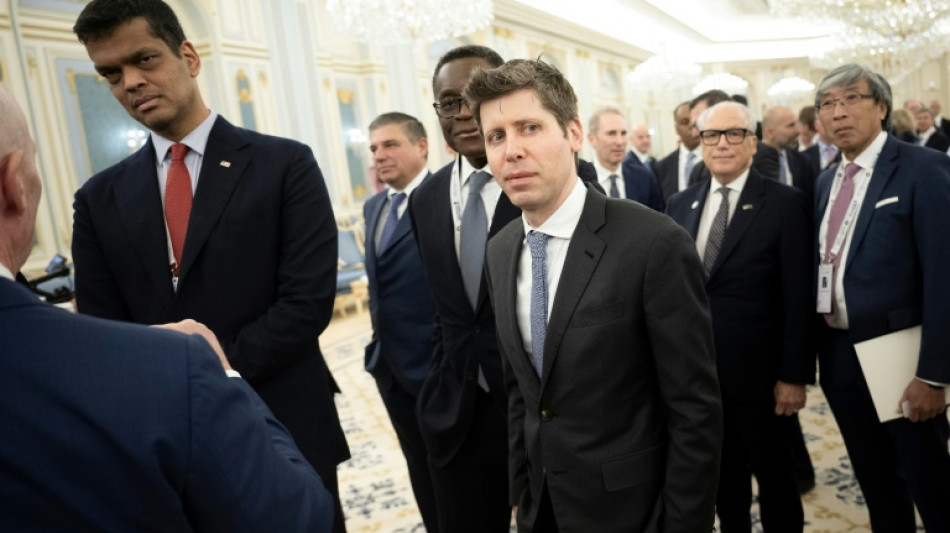
-
 De Minaur, Auger-Aliassime through to Shanghai quarter-finals
De Minaur, Auger-Aliassime through to Shanghai quarter-finals
-
Canal Istanbul stirs fear and uncertainty in nearby villages

-
 Root backs England to end Ashes drought in Australia
Root backs England to end Ashes drought in Australia
-
British PM Starmer hails India opportunities after trade deal
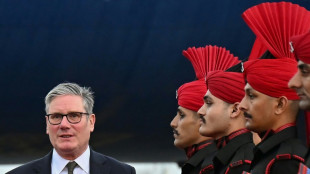
-
 England captain Kane could miss Wales friendly
England captain Kane could miss Wales friendly
-
Tennis increases support for players under corruption, doping investigation

-
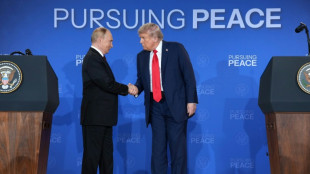 Russia says momentum from Putin-Trump meeting 'gone'
Russia says momentum from Putin-Trump meeting 'gone'
-
EU wants key sectors to use made-in-Europe AI

-
 De Minaur, Rinderknech through to Shanghai quarter-finals
De Minaur, Rinderknech through to Shanghai quarter-finals
-
Gisele Pelicot says 'never' gave consent to accused rapist

-
 Thousands stranded as record floods submerge Vietnam streets
Thousands stranded as record floods submerge Vietnam streets
-
Sabalenka battles to keep Wuhan record alive, Pegula survives marathon

-
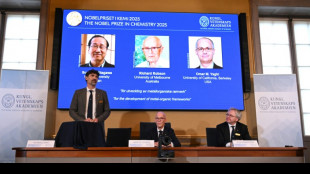 Trio wins chemistry Nobel for new form of molecular architecture
Trio wins chemistry Nobel for new form of molecular architecture
-
Tarnished image and cheating claims in Malaysia football scandal

-
 Family affair as Rinderknech joins Vacherot in Shanghai quarters
Family affair as Rinderknech joins Vacherot in Shanghai quarters
-
New documentary shows life in Gaza for AFP journalists

-
 Tennis stars suffer, wilt and quit in 'brutal' China heat
Tennis stars suffer, wilt and quit in 'brutal' China heat
-
Wildlife flee as floods swamp Indian parks

-
 Record flooding hits Vietnam city, eight killed in north
Record flooding hits Vietnam city, eight killed in north
-
Battling cancer made Vendee Globe win 'more complicated', says skipper Dalin

-
 England, Portugal, Norway closing in on 2026 World Cup
England, Portugal, Norway closing in on 2026 World Cup
-
Child protection vs privacy: decision time for EU

-
 Bear injures two in Japan supermarket, man killed in separate attack
Bear injures two in Japan supermarket, man killed in separate attack
-
In Simandou mountains, Guinea prepares to cash in on iron ore

-
 Morikawa says not to blame for 'rude' Ryder Cup fans
Morikawa says not to blame for 'rude' Ryder Cup fans
-
Far right harvests votes as climate rules roil rural Spain

-
 'Return to elegance': highlights from Paris Fashion Week
'Return to elegance': highlights from Paris Fashion Week
-
Britain's storied Conservative party faces uncertain future
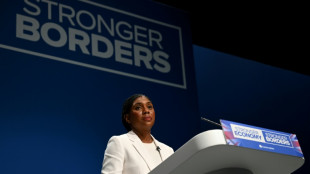
-
 New Zealand's seas warming faster than global average: report
New Zealand's seas warming faster than global average: report
-
Snakebite surge as Bangladesh hit by record rains

-
 Yankees deny Blue Jays playoff sweep as Mariners beat Tigers
Yankees deny Blue Jays playoff sweep as Mariners beat Tigers
-
Australia police foil 'kill team' gang hit near daycare centre

-
 US, Qatar, Turkey to join third day of Gaza peace talks in Egypt
US, Qatar, Turkey to join third day of Gaza peace talks in Egypt
-
Gold tops $4,000 for first time as traders pile into safe haven

-
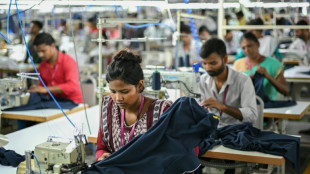 Indian garment exporters reel under US tariffs
Indian garment exporters reel under US tariffs
-
NBA back in China after six-year absence sparked by democracy tweet

-
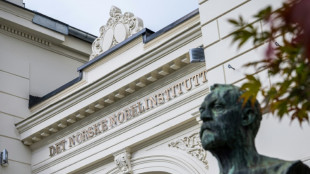 Energy storage and new materials eyed for chemistry Nobel
Energy storage and new materials eyed for chemistry Nobel
-
Trump unlikely to win Nobel Peace Prize, but who will?

-
 Qatar, Turkey to join third day of Gaza peace talks in Egypt
Qatar, Turkey to join third day of Gaza peace talks in Egypt
-
Study finds women have higher genetic risk of depression

-
 Dolly Parton's sister calls for fan prayers over health issues
Dolly Parton's sister calls for fan prayers over health issues
-
On Trump's orders, 200 troops from Texas arrive in Illinois

-
 Two bodies found, two missing after Madrid building collapse
Two bodies found, two missing after Madrid building collapse
-
Panthers raise banner as NHL three-peat bid opens with win

-
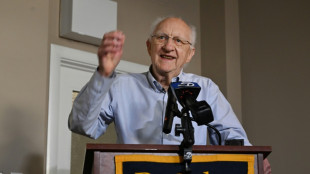 Nobel physics laureate says Trump cuts will 'cripple' US research
Nobel physics laureate says Trump cuts will 'cripple' US research
-
UFC star McGregor suspended 18 months over missed drug tests

-
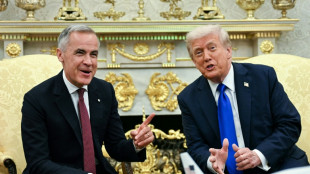 Trump talks up Canada trade deal chances with 'world-class' Carney
Trump talks up Canada trade deal chances with 'world-class' Carney
-
Ecuador president unharmed after apparent gun attack on motorcade

-
 Lyon exact revenge on Arsenal, Barca thrash Bayern in women's Champions League
Lyon exact revenge on Arsenal, Barca thrash Bayern in women's Champions League
-
Trump says 'real chance' to end Gaza war as Israel marks attacks anniversary


With Trump's second term, Big Tech embraces US exceptionalism
Big tech companies are increasingly waving the US flag in Washington where President Donald Trump is back in charge, pushing his America First agenda.
Leading this performance of nationalism are Meta, OpenAI and, more predictably, Palantir, the AI defense company founded by Peter Thiel, the conservative tech billionaire who has played a major role in Silicon Valley's rightward shift.
But the full-throated call to defend the nation -- often paired with warnings about communist China or Europe's regulation -- raises concerns about alienating international partners who represent a significant portion of big tech's business.
In the defense industry, US companies have historically balanced pro-American positioning with patriotic discretion to attract international business.
But Trump and Vice President JD Vance routinely denigrate close allies, all while promoting a nationalist agenda that many US companies feel little choice but to endorse.
While Saudi Arabia and other oil-rich Arab states largely escape Trump's ire, they are investing billions in US AI projects and building their own ventures with White House backing.
Perhaps most surprising is ChatGPT maker OpenAI's embrace of American exceptionalism.
The company now actively lobbies for US tech to become the global platform for generative AI, has adjusted policies to allow defense contracts, and is helping build AI for the Pentagon in partnership with drone maker Anduril, another Thiel-connected company.
"I don't want to live in Europe either," OpenAI CEO Sam Altman told a Senate panel on US AI dominance last week.
"I think America is just an incredible and special thing, and it will not only be the place where the AI revolution happens, but all the revolutions after."
Meta has similarly swung to the right since Trump's return.
CEO Mark Zuckerberg appointed a prominent Republican lobbyist to lead public policy, who regularly criticizes European regulations and aligns Meta's positions with conservative viewpoints.
The company has also touted AI models like its own as "essential for the US to win the AI race against China and ensure American AI dominance."
The most vocal proponent is likely Palantir, whose market valuation has soared based on expectations that its technology will transform security, surveillance and defense.
Tech "is more of a metier or an art form than a science. And all the artists are in America," said Palantir CEO Alex Karp at Washington's Hill and Valley tech conference earlier this month.
Palantir executives largely believe this can only be achieved through overwhelming American military and technological dominance, ensuring global peace through a Pax Americana.
"AI is scary (and) can be abused" by great powers, "which is why we have to win this in America," Karp stated.
- 'Tightrope' -
Professor Sarah Kreps, director of Cornell University's Tech Policy Institute, notes that defense technology companies like Palantir must balance US allegiance with respect for national sovereignty abroad.
"It's a diplomatic tightrope. When the political rhetoric becomes too parochial or polarizing—especially tied to specific administrations—it risks undermining" US companies' appeal overseas, she explained.
Trump's nationalism is pressuring companies to adopt patriotic positions that Silicon Valley traditionally avoided, but this "can create friction abroad, especially in Europe, where concerns about sovereignty, data localization, and technological dependence are growing," Kreps added.
Taking a more measured approach is Microsoft, the 50-year-old tech giant that—like rivals Google and Amazon Web Services—serves both the US government and foreign markets where American nationalism might deter potential customers.
For decades, co-chairman and president Brad Smith has navigated this complex terrain, aligning with Washington's political climate while reassuring global customers of Microsoft's trustworthiness. While co-founder Bill Gates, who now serves as an advisor to Microsoft, spoke out against Trump's tariffs this week, Smith walks the line more carefully.
"We need to remember that as a country, only four and a half percent of the world's people live in the United States," Smith told the same Senate panel where OpenAI's Altman advocated for US leadership in AI.
The risks extend beyond lost sales opportunities.
Microsoft's business, like all US tech giants, depends on agreements allowing transatlantic data flows—arrangements repeatedly challenged in EU courts.
Professor Susan Ariel Aaronson of George Washington University warns these arrangements are precarious.
"American AI will not be successful if it is not trusted. And how do you build trust? You don't become the world's disrupter," she told AFP.
H.Kuenzler--VB
